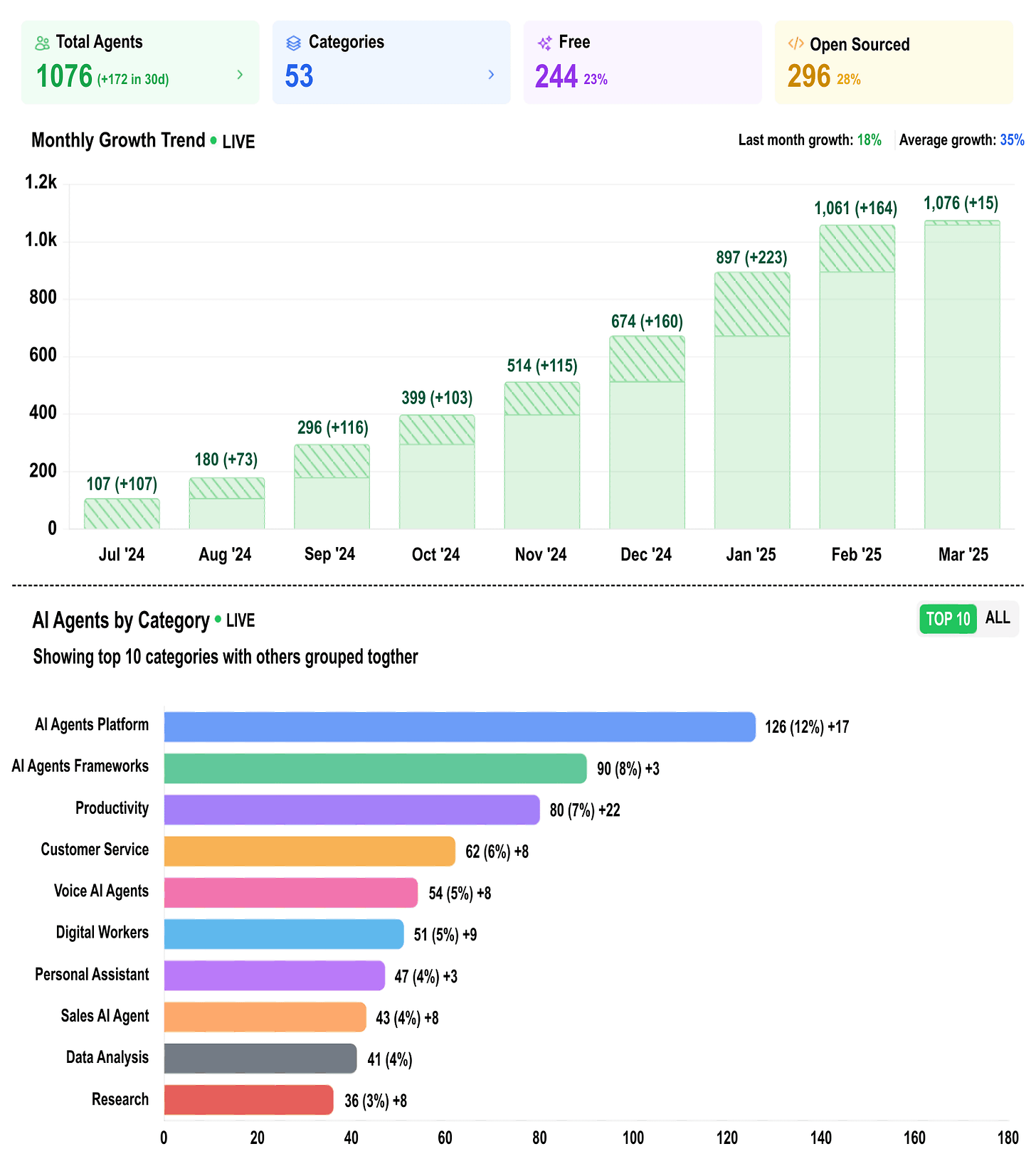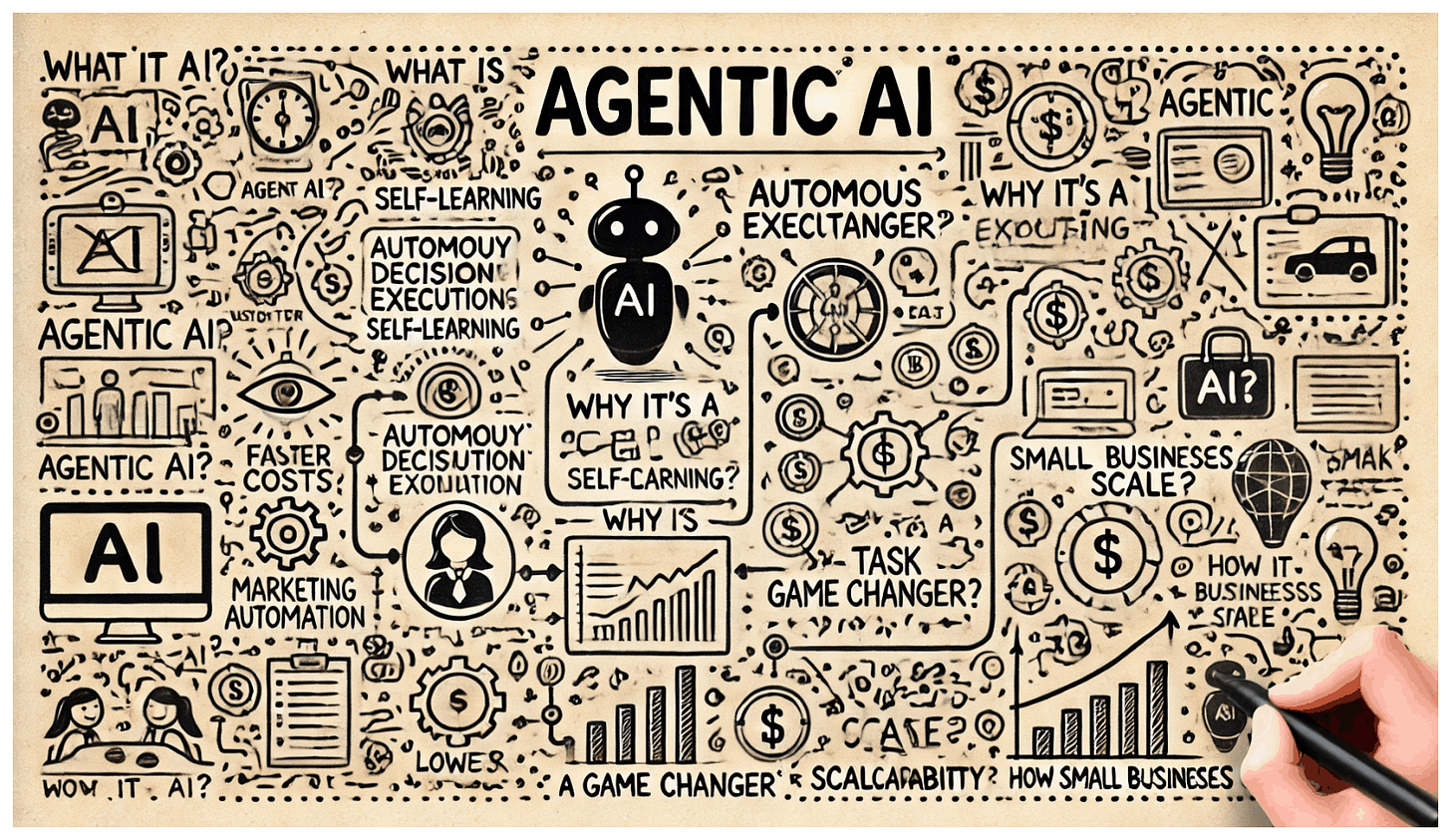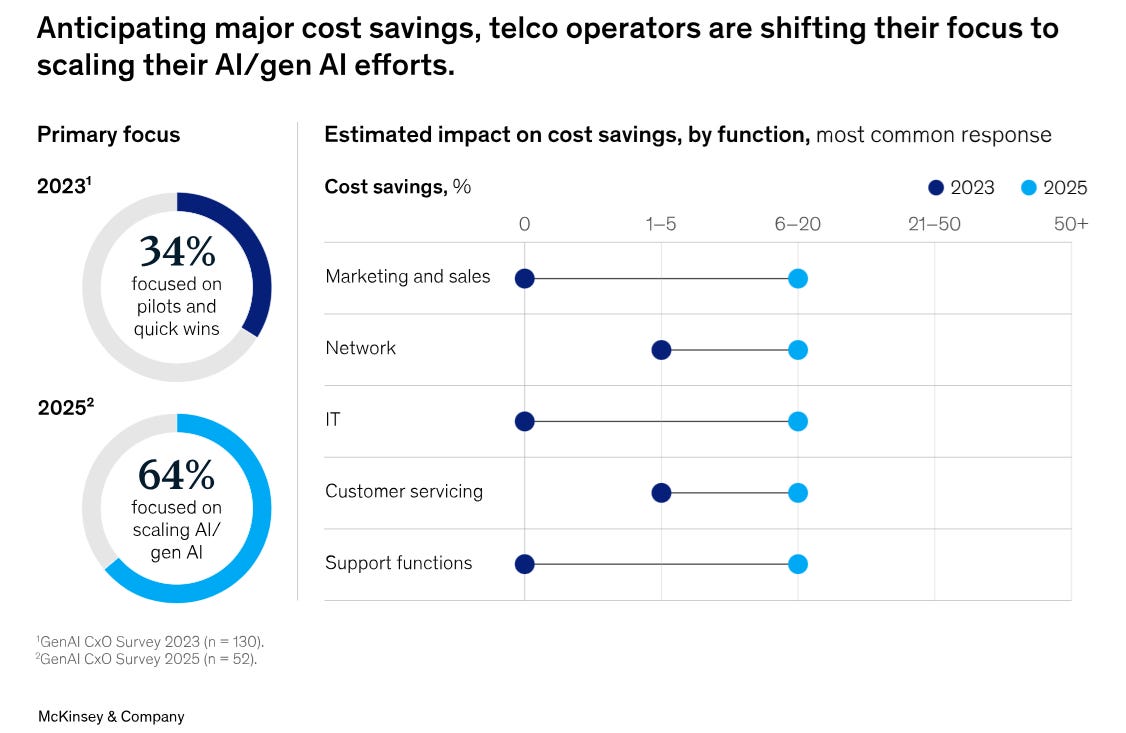Welcome to Binary Circuits’ 11th weekly edition
Your weekly guide to most important developments in technological world
Dear Readers,
This week's edition of Binary Circuit explores agentic AI, a game-changing boost in automation, scalability, and business efficiency. We discuss how AI agents create equal opportunities, enhance business strategy, and innovate to drive growth. Additionally, we examine why embracing uncertainty is an effective leadership strategy.
Agentic AI is a game changer in building real-world applications and equalizing the playing field between small and big firms. The opportunity is immense—time to rethink business strategy!
Agentic AI systems are characterized as autonomous functions that can adapt and respond to environmental and data changes. Independent perception, reason, action, and learning made possible by agentic AI enable autonomous operations. Agentic AI’s unique ability to shift the technical landscape from passive analysis to active problem-solving offers unprecedented potential to revolutionize several industries.
Agentic AI is becoming increasingly popular for its adaptability, error-reducing power, and simplicity of adding new capabilities. Running on home computers, AI agents can communicate with numerous web services.
Some key statistics to consider:
The agentic AI market is anticipated to expand at a CAGR of nearly 45%, increasing from $5.1 billion in 2024 to $47.1 billion by 2030. This growth is expected to accrue to sectors such as banking, healthcare, software development, logistics, and content creation.
Corporate AI use is rising, with 40% of Fortune 500 companies using AI agents. Last year, 26% of firms examined agentic AI for autonomous task execution, and 83% of sales teams that use AI reported higher revenues.
Automating interview scheduling and resume processing boosts efficiency for nearly half of HR teams. AI is used by 90% of investment managers, with 54% utilizing it to analyze financial and alternative data in real time to better decision-making. One-third of supply chain and logistics procurement software will integrate agentic AI by 2028, with agents making at least 15% of daily decisions independently.
AI-targeted ads boost merchant profits. An astonishing 69% of retailers utilizing AI agents say that personalized shopping experiences boost revenue. E-commerce companies deploying AI agents report 76% higher revenue and efficiency.
Agentic AI makes LLM-based systems more resilient and effective by applying best practices in software architecture. Agentic AI’s modularity breaks systems into independent components for easier management and lower LLM costs. At the same time, scalability allows parallel processing and optimized resource allocation. In contrast, reliability is achieved through “separation of concerns,” where components are organized by functions to minimize dependencies and improve error isolation.
AI-first enterprises will grow swiftly to compete with larger, more resourced ones.
Once, company growth was limited by its capacity for personnel management. Agentic AI removes this barrier. AI-powered companies can rapidly grow without recruiting thousands of employees by including more AI agents with flawless efficiency and memory.
Agentic AI’s most fascinating outcome is a leveled playing field. Without massive funds or workforce, startups and smaller businesses may now match great giants' scale, efficiency, and intelligence. From 1% in 2024, automating 15% of daily work decisions, estimations show that agentic artificial intelligence will be included in 33% of enterprise software applications in 2028.
Some examples to consider:
Replit and Cursor, AI-powered coding tools, enable small development teams to write, test, and deliver software quickly, eliminating the need for big technical teams.
Open-source workflow automation tools such as n8n let users design AI agents capable of interacting with more than 400 additional services and other LLMs.
Real-time market, consumer, and competitive analysis by automated research and strategy agents lets small firms make data-driven decisions like enterprise analytics teams.
Using AI agents like ChatGPT bots or Intercom’s AI assistants, companies may provide tailored, 24/7 customer support, therefore enhancing service and reducing costs.
Jasper and Copy.ai, AI-driven marketing systems, help small businesses compete with big brands in digital marketing by creating great content, optimizing ads, and personalizing outreach.
Agentic AI has three primary business benefits:
Autonomous Decision-Making—AI agents improve accuracy by rapidly analyzing complicated data, lowering the decision-making time. For instance, AI-powered fraud detection can independently flag transactions, reducing the required human involvement.
Scalability and Productivity—Automating repetitive processes lessens operational complexity. Companies can grow quicker without commensurate higher personnel expenditures. For example, GAI can independently change inventories in real-time in supply chain optimization.
Customization—AI agents examine consumer data to personalize contacts and improve client loyalty. E-commerce artificial intelligence agents, for instance, can dynamically suggest items depending on past activity.
AI agents for web browsers could quickly penetrate workflows. These AI agents can independently access websites, compile data, and make purchases. They advance automated procedures, customer service, and research.
Some important participants in this field are:
OpenAI's Operator, currently in a research preview mode, can perform activities on a webpage by typing, clicking, and scrolling.
Convergence’s Proxy can do several tasks, from simple information retrieval to multi-step workflows.
Google’s Project Mariner is an AI agent under development that offers multimodal understanding and reasoning capabilities to automate tasks using your browser
Anthropic’s Computer Use is an agent that can take control of the desktop to execute workflow, improving data analysis, visualization, and user interface interactions.
Microsoft's OmniPolV2 is an open-source AI agent that turns UI screenshots into organized data so AI may interact with and comprehend webpages.
Browser-Use allows consumers to choose AI models, including Gemini 2.0 Flash from Google.
Agentic AI is clearly the next significant change in the fast-changing business landscape. It can manage complicated processes and even make decisions, enabling businesses to expand quickly with less staff. Those who start now will be well ahead of those who wait.
Here is what you can do: Aimed at speed-to-value, this transformation calls for a basic change in both operations and perspective all around the company. The following main actions describe how to get underway:
Make sure your digital systems completely complement your actual business operations. Verify often whether the two are in sync to prevent any disconnection that would reduce the advantages of fast value distribution.
Specify the perfect results and outputs from your processes. To enable quick iterations and consistent progress towards your long-term vision, break these great goals into smaller, doable actions.
Understanding that agentic processes are not totally self-contained. Determine key points where human intervention is required to preserve accuracy and quality, therefore preventing little errors from becoming worse.
Create a strong feedback system whereby each encounter helps to improve agent performance and refines your models. Differentiate between comments meant to actively inspire value and those meant only to support continuous innovation by means of information.
The opportunity is here. Now is the moment to act.
Embracing uncertainty is a powerful leadership strategy in the age of AI. Resilience triumphs over certainty
In an era defined by the constant availability of information, it's easy to equate knowledge with power. We celebrate accomplishments, awards, and honors, often measuring our worth by how much we know. But what if our unrelenting quest for information eclipses a deeper reservoir of strength: the power of not knowing?
We can all agree that uncertainty is unpleasant, but it is also necessary for growth. Harvard senior English teacher Shruthi Kumar encourages students to "dive into the deep end of discomfort" and “engage with the nuances” of the unknown. Our experiences, especially ambiguous ones, often lead to unexpected growth. Uncertain circumstances foster solidarity and resilience. Now, leaders are struggling to navigate a world they “just don't know.” This requires sensitivity, humility, and the ability to question rather than simply solve.
Changing our perspective to that of a novice helps us approach events with openness and inquiry. As Zen master Shunryu Suzuki, author of The Beginner’s Mind, says, “In the beginner’s mind, there are many possibilities. For experts, there are few.” This kind of thinking is a strength rather than a flaw. Researchers at Yale University conducted a 2015 study titled “The Curse of Expertise,” which revealed that experience could lead to overconfidence and an “illusion of knowing.”
In leadership, adaptation to the unknown is vital. Instead of aiming to perfect a plan, leaders should allow for experimentation, normalize course deviations, and construct teams comfortable with ambiguity. The best leaders say, “I don't know, but let's find out.” Resilience and adaptability are more important than future prediction.
Accepting uncertainty implies enjoying the “beautiful imperfection of many things.” We should pursue our many passions rather than focusing on one. There will be challenges, but trusting oneself and following one's path will provide satisfaction and contentment.
Important aspects of accepting uncertainty:
Self-awareness and appreciation of knowledge boundaries.
Develop empathy and humility.
Be open to learning from others.
Support transdisciplinary thinking.
Start with a fresh perspective.
By acknowledging the unknown and encouraging adaptability, leaders can build companies that thrive in change.
Chart of the Week:
Two years ago, only a few telecom companies were using Artificial Intelligence (AI) in a big way. But now, almost all telco companies are using AI and getting benefits from it.
A recent survey from McKinsey found that about 50% of top executives at telco companies are already seeing results from using AI, which is twice as many as last year.
Sound bites you should know:
Morgan Stanley predicts a 20x increase in generative AI revenues to $1.1 trillion in three years. Imagine the magnitude of an industry that didn’t exist a few years ago. Immense opportunities!
Google’s new AI Mode brings advanced reasoning and multi-step query handling to web search. No more endless pages of searches.
Researchers from Zoom Communications introduced Chain of Draft (CoD), a new AI reasoning technique that cuts text use by 92% while preserving accuracy. Cheaper and faster enterprise AI for everyone.
AI agents will now have long-term memory, helping them remember context and recollect interactions. This will enable the execution of difficult tasks over time.
An AI tool, MELD Graph, improves epilepsy detection by 64% of brain abnormalities missed by radiologists. AI is poised to have a big impact on improving healthcare.
Thank you for reading! Please let us know if you have any comments or feedback.
Team,
Binary Circuit




